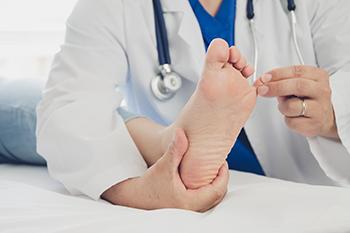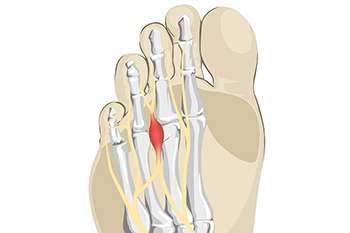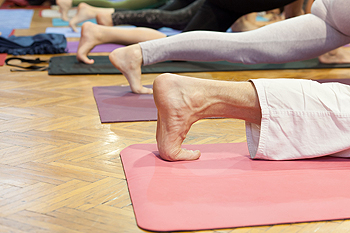Items filtered by date: April 2022
What Does a Podiatrist Do?

A podiatrist is a medical doctor who specializes in the treatment of the many conditions that affect your toes, feet, and ankles. Podiatrists have a degree in medicine and have undergone further training in their specialty. Their main job is to promote mobility and activity, reduce pain, and treat infections related to the feet and ankles. They handle simple cases, including corns and calluses, ingrown toenails, fungal infections, and plantar warts, to name a few. Podiatrists also treat more complex problems, such as bunions and heel pain (plantar fasciitis), as well as ankle sprains, Achilles tendon injuries, and broken bones. Podiatrists can help with orthotics for specific foot problems as well as offer treatment for people with chronic conditions that can seriously affect the feet, such as diabetes, peripheral artery disease, and peripheral neuropathy. If you have any foot, toe, or ankle ailment, it is a good idea to seek the help of a podiatrist for a full examination, a diagnosis, and treatment options.
If you are dealing with pain in your feet and ankles, you may want to seek help from a podiatrist. Feel free to contact one of our podiatrists from Palmetto Podiatry Group of Anderson. Our doctors can provide the care you need to keep you pain-free and on your feet.
What Is a Podiatrist?
A podiatrist is a doctor of podiatric medicine who diagnoses and treats conditions of the foot, ankle, and related structures of the leg. Your podiatrist may specialize in a certain field such as sports medicine, wound care, pediatrics, and diabetic care. Podiatrists have the ability to become board certified through training, clinical experience, and then taking an exam.
What Do Podiatrists Do?
On a daily basis, a podiatrist may perform the following activities:
- Diagnose foot ailments such as ulcers, tumors, fractures, etc.
- Use innovative methods to treat conditions
- Use corrective orthotics, casts, and strappings to correct deformities
- Correct walking patterns and balance
- Provide individual consultations to patients
It is very important that you take care of your feet. It’s easy to take having healthy feet for granted, however foot problems tend to be among the most common health conditions. Podiatrists can help diagnose and treat a variety of feet related conditions, so it is crucial that you visit one if you need assistance.
If you have any questions please feel free to contact our office located in Anderson, SC . We offer the newest diagnostic and treatment technologies for all your foot and ankle needs.
Pebble Sensation May Indicate Morton’s Neuroma
 The foot condition that is known as Morton’s neuroma can cause pain and discomfort, and it often makes walking difficult. The pain is generally felt in the bottom of the foot, and many patients describe it as a burning and stabbing feeling. Morton's neuroma affects the tissue that surrounds a nerve in the ball of the foot and can be caused by several reasons. These reasons can include having a poor running technique, wearing running shoes that are too tight, or possibly having flat feet or bunions. The pain is described as having the sensation of standing on a marble or pebble. Additional symptoms can include numbness in the toes, and if it is not treated, it may lead to severe pain, causing the patient to limp. A podiatrist is qualified to perform a proper diagnosis, which can consist of having an X-ray taken, or from a manual exam. If you have foot pain, it is strongly suggested that you confer with a podiatrist as quickly as possible, who can provide you with correct treatment techniques.
The foot condition that is known as Morton’s neuroma can cause pain and discomfort, and it often makes walking difficult. The pain is generally felt in the bottom of the foot, and many patients describe it as a burning and stabbing feeling. Morton's neuroma affects the tissue that surrounds a nerve in the ball of the foot and can be caused by several reasons. These reasons can include having a poor running technique, wearing running shoes that are too tight, or possibly having flat feet or bunions. The pain is described as having the sensation of standing on a marble or pebble. Additional symptoms can include numbness in the toes, and if it is not treated, it may lead to severe pain, causing the patient to limp. A podiatrist is qualified to perform a proper diagnosis, which can consist of having an X-ray taken, or from a manual exam. If you have foot pain, it is strongly suggested that you confer with a podiatrist as quickly as possible, who can provide you with correct treatment techniques.
Morton’s neuroma is a very uncomfortable condition to live with. If you think you have Morton’s neuroma, contact one of our podiatrists of Palmetto Podiatry Group of Anderson. Our doctors will attend to all of your foot care needs and answer any of your related questions.
Morton’s Neuroma
Morton's neuroma is a painful foot condition that commonly affects the areas between the second and third or third and fourth toe, although other areas of the foot are also susceptible. Morton’s neuroma is caused by an inflamed nerve in the foot that is being squeezed and aggravated by surrounding bones.
What Increases the Chances of Having Morton’s Neuroma?
- Ill-fitting high heels or shoes that add pressure to the toe or foot
- Jogging, running or any sport that involves constant impact to the foot
- Flat feet, bunions, and any other foot deformities
Morton’s neuroma is a very treatable condition. Orthotics and shoe inserts can often be used to alleviate the pain on the forefront of the feet. In more severe cases, corticosteroids can also be prescribed. In order to figure out the best treatment for your neuroma, it’s recommended to seek the care of a podiatrist who can diagnose your condition and provide different treatment options.
If you have any questions, please feel free to contact our office located in Anderson, SC . We offer the newest diagnostic and treatment technologies for all your foot care needs.
It's Time for Beautiful Feet
Stretching the Feet May Help High Heel Wearers
 Recent research has indicated the most common place on the body that is affected by wearing high heels are the feet. Excess pressure is placed on the front of the foot when high heels are worn. When this type of shoe is frequently worn, serious foot conditions may develop. Some of these can include bunions, hammertoes, and Morton’s neuroma. Many people who enjoy wearing high heels understand the benefits of properly stretching the Achilles tendon at the end of the day. This can be done by standing on a step, and gently stretching the heel downward. Additionally, rotating the ankle in circles can help to strengthen the entire foot. If you have questions about wearing high heels, and how they can affect your feet, please speak with a podiatrist.
Recent research has indicated the most common place on the body that is affected by wearing high heels are the feet. Excess pressure is placed on the front of the foot when high heels are worn. When this type of shoe is frequently worn, serious foot conditions may develop. Some of these can include bunions, hammertoes, and Morton’s neuroma. Many people who enjoy wearing high heels understand the benefits of properly stretching the Achilles tendon at the end of the day. This can be done by standing on a step, and gently stretching the heel downward. Additionally, rotating the ankle in circles can help to strengthen the entire foot. If you have questions about wearing high heels, and how they can affect your feet, please speak with a podiatrist.
High heels have a history of causing foot and ankle problems. If you have any concerns about your feet or ankles, contact one of our podiatrists from Palmetto Podiatry Group of Anderson. Our doctors can provide the care you need to keep you pain-free and on your feet.
Effects of High Heels on the Feet
High heels are popular shoes among women because of their many styles and societal appeal. Despite this, high heels can still cause many health problems if worn too frequently.
Which Parts of My Body Will Be Affected by High Heels?
- Ankle Joints
- Achilles Tendon – May shorten and stiffen with prolonged wear
- Balls of the Feet
- Knees – Heels cause the knees to bend constantly, creating stress on them
- Back – They decrease the spine’s ability to absorb shock, which may lead to back pain. The vertebrae of the lower back may compress.
What Kinds of Foot Problems Can Develop from Wearing High Heels?
- Corns
- Calluses
- Hammertoe
- Bunions
- Morton’s Neuroma
- Plantar Fasciitis
How Can I Still Wear High Heels and Maintain Foot Health?
If you want to wear high heeled shoes, make sure that you are not wearing them every day, as this will help prevent long term physical problems. Try wearing thicker heels as opposed to stilettos to distribute weight more evenly across the feet. Always make sure you are wearing the proper shoes for the right occasion, such as sneakers for exercising. If you walk to work, try carrying your heels with you and changing into them once you arrive at work. Adding inserts to your heels can help cushion your feet and absorb shock. Full foot inserts or metatarsal pads are available.
If you have any questions please feel free to contact our office located in Anderson, SC . We offer the newest diagnostic and treatment technologies for all your foot and ankle needs.
What Are the Benefits of Stretching the Feet?
 Many patients have occupations that require standing for most of the day. The heel of the foot is often affected by this, and conditions can develop including plantar fasciitis and heel spurs. When the feet are properly stretched it can positively affect the overall body. The standing lunging calf stretch can help to diminish tension in the body that is caused by standing. This stretch may help to promote circulation in the calf muscles which can affect the Achilles tendon. The heels can be stretched by rolling the foot on a tennis ball. Additionally, standing on a step and slowly lowering the heel until a gentle stretch is felt is another way of successfully stretching the heels. If you would like more information about effective foot stretches, please confer with a podiatrist.
Many patients have occupations that require standing for most of the day. The heel of the foot is often affected by this, and conditions can develop including plantar fasciitis and heel spurs. When the feet are properly stretched it can positively affect the overall body. The standing lunging calf stretch can help to diminish tension in the body that is caused by standing. This stretch may help to promote circulation in the calf muscles which can affect the Achilles tendon. The heels can be stretched by rolling the foot on a tennis ball. Additionally, standing on a step and slowly lowering the heel until a gentle stretch is felt is another way of successfully stretching the heels. If you would like more information about effective foot stretches, please confer with a podiatrist.
Stretching the feet is a great way to prevent injuries. If you have any concerns with your feet consult with one of our podiatrists from Palmetto Podiatry Group of Anderson. Our doctors will assess your condition and provide you with quality foot and ankle treatment.
Stretching the Feet
Being the backbone of the body, the feet carry your entire weight and can easily become overexerted, causing cramps and pain. As with any body part, stretching your feet can serve many benefits. From increasing flexibility to even providing some pain relief, be sure to give your feet a stretch from time to time. This is especially important for athletes or anyone performing aerobic exercises, but anyone experiencing foot pain or is on their feet constantly should also engage in this practice.
Great ways to stretch your feet:
- Crossing one leg over the others and carefully pull your toes back. Do 10-20 repetitions and repeat the process for each foot
- Face a wall with your arms out and hands flat against the wall. Step back with one foot and keep it flat on the floor while moving the other leg forward. Lean towards the wall until you feel a stretch. Hold for 30 seconds and perform 10 repetitions for each foot
- Be sure not to overextend or push your limbs too hard or you could risk pulling or straining your muscle
Individuals who tend to their feet by regular stretching every day should be able to minimize foot pain and prevent new problems from arising.
If you have any questions, please feel free to contact our office located in Anderson, SC . We offer the newest diagnostic and treatment technologies for all your foot care needs.

